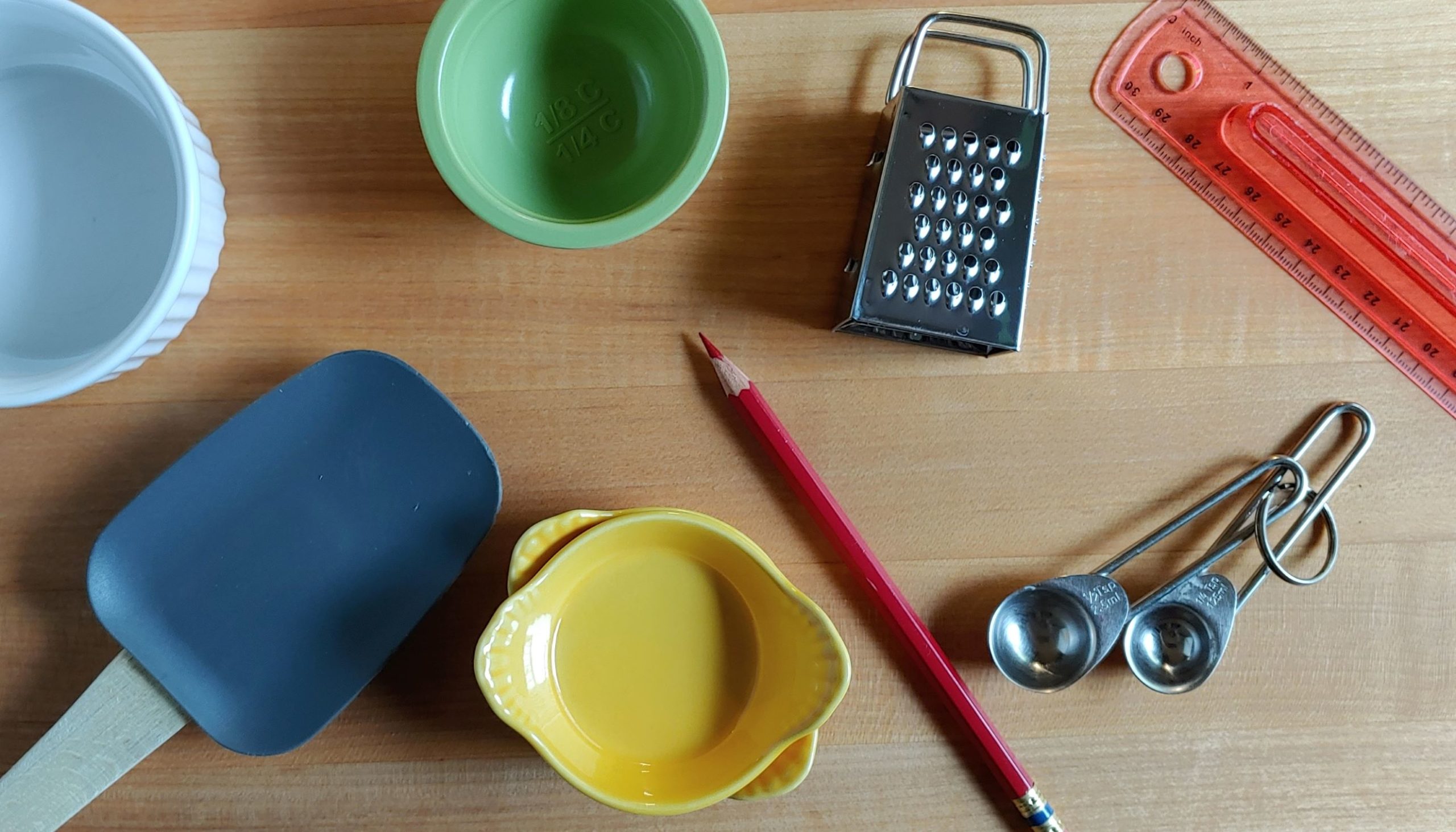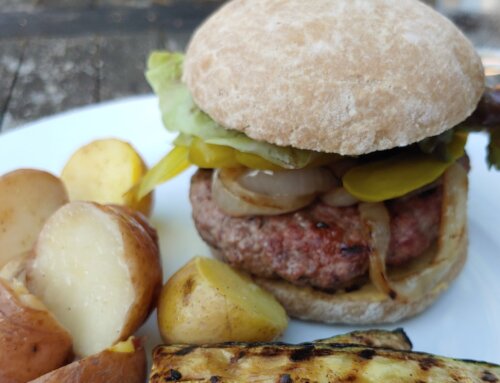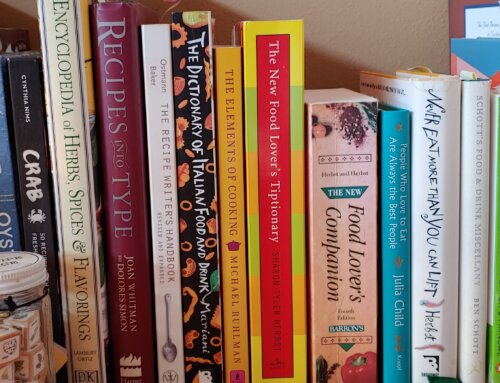It was a simple tossed salad that put me over the edge. Not the salad itself, mind you. But where the salad showed up in the recipe I was skimming in a cookbook whose name I don’t even recall. The lettuces and vinaigrette were tossed together in a bowl, as is a perfectly normal thing to do. Except that these lettuces were to serve as the bed for roasted beets (among other accoutrements). And the very next step in the recipe was to roast said beets. As every minute–45 to 60 or so depending on size–ticks by with those beets in the oven, the greens become more and more of a wilty mass. It made my recipe-writing head explode.
I realized that while experienced cooks could easily make necessary mental adjustments and wait to toss the lettuce just before serving, others following the recipe exactly would have disappointing results. Which has the distinct possibility of leaving that person feeling they did something wrong or they’re a bad cook, if not both. And I got frustrated on their behalf, as I have so many other times seeing similar problems in recipes.
When the frustration began to clear that particular day, my attention turned to what it is I’ve learned about writing recipes over the years that provides a lens for spotting problems like that one. My hodge-podge accumulation of experience, understanding, insights and expertise grew gradually over the years without me giving it particular thought. It’s the product of having spent time in the kitchen with fabulous cooks (starting with my mom), from working with amazing mentors, from fellow food writers and from working on a few dozen cookbooks (in various capacities from sole author to editor) and many magazine articles: I’ve written/edited/tested/etc. over 3300 recipes—and counting. Then there’s all the off-the-clock time I spend just playing around in the kitchen.
Taking Stock
I sat down after lamenting that sad, wilty salad and starting making notes that I’ve been adding to ever since. They cover standard best practices for recipe writing, and all manner of perspective and opinion I have about factors that go into reliable, engaging recipes, such as knowing your audience, personal voice and everything I can think to say about ingredient lists and recipe method.
I thought, too, about the range of elements from technical to creative that writers balance in recipes, based on their own style and approach. Pure formula can provide a technically accurate recipe but miss descriptive and sensory language that helps the home cook. And more creative approaches may lack technical details–such as cooking times and temperature settings–the home cook needs to recreate the dish. Examples of successful balance include recipes that delve into more scientific aspects of cooking but with descriptions and explanations that help less-technically-minded readers follow the principles being presented. And a recipe given in purely narrative form can still guide the home cook well if it drops in necessary basics about ingredients and method. You can find a lot of interesting, creative potential across that spectrum.
There is, to be clear, no one “right” way to write recipes. Far from it. Approaches can and should reflect the perspectives and personality of the writer, the audience using the recipe and the general context of where and how it will be presented. Awareness of these factors certainly doesn’t make me or any other recipe writer immune to mistakes. It’s that awareness itself that makes it possible to observe and understand where there may be room for improvement, whether it’s noticed early in the recipe writing process, on final review or after publication–which still happens to the best of us. (I so enjoyed the opportunity to talk about these and other aspects of recipe writing with Maggie Green on her Cookbook Love Podcast, you can check out that episode here.)
Problem-Solving with Recipes
That moment of frustration a few years ago sent me on a deep dive into contemplating the art and craft of writing good recipes. I wanted to turn that frustration into some form of problem-solving. It has been an exercise that basically channels the work I’ve been doing for 25+ years toward working with others who use recipes as a means to inspire, instruct, motivate or engage with the home cook. That could be food writers, bloggers, nutritionists, culinary PR folks and specialty food companies, among many others.
The result is a new recipe-oriented focus added to the consulting services I offer. I call it Better Recipes. Flawless or perfect is far from the point. There are a whole slew of things to keep in mind when writing recipes, it can be rather overwhelming. I believe that even a few new considerations added to a recipe writer’s toolkit can lead to solid improvement. It’s a process, an evolution. I’m still evolving, learning new things as I go and adjusting how I write recipes accordingly. Every step large or small toward better recipes is just great.
I taught a recipe-writing class at Book Larder early February, which was super fun and engaging; another class set for last month was postponed. A few years back I lead a webinar for nutrition professionals about recipe writing that was so well received I was asked to do it again. In addition to my own projects, I’ve helped chefs, food brands and individual writers hone their recipes in various ways. I look forward to more opportunities like these to share my enthusiasm for recipe writing with any and all who are interested.
The Power of Recipes
I’ve put a lot of thought into what it is that recipes accomplish (which is a lot more than just getting dinner on the table or a snack in your hand). And I feel strongly in my bones that there’s a great deal of value in a well-written recipe. Beyond a delicious, reliable outcome in the kitchen, solid recipes build trust and confidence in the recipe’s source–whether a writer, chef, retail store or food brand. Recipes reflect their source, with reflections that can be good, bad or indifferent. I’ve talked with countless folks–from the food world and the general population–who have encountered their share of bad recipes, some recalling specific detail about exactly where one lead them astray. My mission is to help there be more good impressions made by recipes, with precise, clear, thoughtful writing that make every effort to ensure success for the home cook.
I’ll be sharing more of my perspectives, as well as those I come across from recipe-writer colleagues and other random recipe-related tidbits, here now and then. And on social media as well (including my Facebook business page). Trust me: I’ve got lots and lots of thoughts and stories to share.




